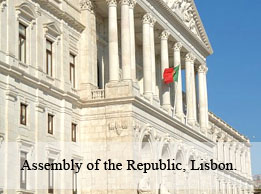ADVERTISEMENT
|
|
|
Portugal Travel & Tourism Guide
Government & Politics of Portugal
NextGen Day offers travel tips and information for top travel places and best destinations in Africa, Asia, Australia, Europe, Middle East and United States of America. We feature Middle East links, Middle East resources and large selection of Middle East budget airlines, Middle East chartered planes, Middle East sea cruises, Middle East ferries, Middle East travel agencies, Middle East land transports and Middle East attractions including Middle East beaches, Middle East medical tourism, Middle East retirement homes, Middle East historical and Middle East pilgrimage tours.
 Portugal is a democratic republic ruled by the constitution of 1976 with Lisbon, the nation's largest city, as its capital. The four main governing components are the president of the republic, the parliament, the government, and the courts. The constitution grants the division or separation of powers among legislative, executive, and judicial branches. Portugal like most European countries has no state religion, making it a secular state. Portugal is a democratic republic ruled by the constitution of 1976 with Lisbon, the nation's largest city, as its capital. The four main governing components are the president of the republic, the parliament, the government, and the courts. The constitution grants the division or separation of powers among legislative, executive, and judicial branches. Portugal like most European countries has no state religion, making it a secular state.
The president, who is elected to a five-year term, has a supervising non-executive role. The current President is Aníbal Cavaco Silva. The Parliament is a chamber composed of 230 deputies elected in four-year terms. The government is headed by the prime minister (currently José Sócrates) who chooses the Council of Ministers, comprising all the ministers and state secretaries.
The national and regional governments (those of Azores and Madeira autonomous regions), and the Portuguese parliament, are dominated by two political parties, the Socialist Party and the Social Democratic Party. Minority parties Unitarian Democratic Coalition (Portuguese Communist Party plus Ecologist Party "The Greens"), Bloco de Esquerda (The Left Bloc) and CDS-PP (People's Party) are also represented in the parliament and local governments.
The courts are organized in several categories comprising the judicial, administrative, and fiscal branches. The supreme courts are courts of last appeal. A thirteen-member constitutional court oversees the constitutionality of the laws.
Executive Branch
The President, elected to a 5-year term by direct, universal suffrage, is also commander-in-chief of the armed forces. Presidential powers include appointing the prime minister and Council of Ministers, in which the president must be guided by the assembly election results; dismissing the prime minister; dissolving the assembly to call early elections; vetoing legislation, which may be overridden by the assembly; and declaring a state of war or siege.
The Council of State, a presidential advisory body, is composed of six senior civilian officers, any former presidents elected under the 1976 constitution, five members chosen by the assembly, and five selected by the president. The government is headed by the presidentially appointed prime minister, who names the Council of Ministers. A new government is required to define the broad outline of its policy in a program and present it to the assembly for a mandatory period of debate. Failure of the assembly to reject the program by a majority of deputies confirms the government in office.
Legislative Branch
The four main organs of the national government are the presidency, the prime minister and Council of Ministers, the Assembly of the Republic, and the judiciary. The Assembly of the Republic is a unicameral body composed of up to 230 deputies. Elected by universal suffrage according to a system of proportional representation, deputies serve terms of office of 4 years, unless the president dissolves the assembly and calls for new elections.
Source: Wikipedia Encyclopedia
Portugal Hotels
<1> <2> <3> <4> <5> |

 Portugal is a democratic republic ruled by the constitution of 1976 with Lisbon, the nation's largest city, as its capital. The four main governing components are the president of the republic, the parliament, the government, and the courts. The constitution grants the division or separation of powers among legislative, executive, and judicial branches. Portugal like most European countries has no state religion, making it a secular state.
Portugal is a democratic republic ruled by the constitution of 1976 with Lisbon, the nation's largest city, as its capital. The four main governing components are the president of the republic, the parliament, the government, and the courts. The constitution grants the division or separation of powers among legislative, executive, and judicial branches. Portugal like most European countries has no state religion, making it a secular state.